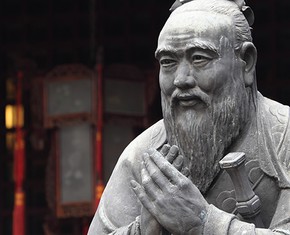The views expressed in our content reflect individual perspectives and do not represent the authoritative views of the Baha'i Faith.
So after some gentle prodding by God, and despite my born-again Christian beliefs, I began to read the Baha’i writings.
The Baha’i concept of the independent investigation of truth really set off my inner light bulb. It turns out that Baha’u’llah, the founder of the Baha’i Faith, urges humanity to “know through thy own knowledge and not the knowledge of others” and to cleanse our hearts “from every marking” of the imitation of our forefathers and our inherited cultural assumptions. Not easy, but if I honestly sought the truth, it seemed like good advice.
It seemed that this Faith said God is too big for us mere mortals to comprehend, so any conception that we have of Him by definition can’t be bigger than our own thoughts. He is infinite; we are not. For instance, I’m still stumped (and even a little angry) that mosquitoes exist. Yeah, you laugh, but they do seem pretty useless, right? Given that I can’t understand that, how much less can I wrap my head around the Creator of all things? As much as I wanted to, I really just can’t, much in the same way that a table can’t comprehend the carpenter who crafted it.
So how, I wondered, was this all supposed to work? It seemed pretty clear that God wanted to have a relationship with me, but I wasn’t sure how to get to Him through this confusing forest of Faiths.
I read further. It turns out that Baha’u’llah said the only connection that human beings have with God is through the founders, or Manifestations, of the world’s great religions. Since they completely mirror the perfections and attributes of God in their lives and writings, they allow us to experience God for ourselves. They alone, the Baha’i teachings say, can change our hearts as individuals and lead us to build a new, free, just and loving civilization.
But my stubborn, original questions kept coming back. How did all of those “great religions” relate to each other? Weren’t there contradictions?
 I studied some more, and I learned that the Baha’i Faith had introduced a concept called “progressive revelation.” That idea really changed the way I thought God worked. While before I had looked at the different world religions as being like a bunch of feuding teenagers arguing about who was right and who was wrong, from a Baha’i perspective I started seeing a bigger picture. What if all of the religions just represented different steps along the same path — the path of individual and collective progress? I was skeptical, but honestly intrigued.
I studied some more, and I learned that the Baha’i Faith had introduced a concept called “progressive revelation.” That idea really changed the way I thought God worked. While before I had looked at the different world religions as being like a bunch of feuding teenagers arguing about who was right and who was wrong, from a Baha’i perspective I started seeing a bigger picture. What if all of the religions just represented different steps along the same path — the path of individual and collective progress? I was skeptical, but honestly intrigued.
One saying in particular by Abdu’l-Baha, the son of Baha’u’llah, really hit home:
The differences among the religions of the world are due to the varying types of minds. So long as the powers of the mind are various, it is certain that men’s judgments and opinions will differ one from another. If, however, one single, universal perceptive power be introduced — a power encompassing all the rest — those differing opinions will merge, and a spiritual harmony and oneness will become apparent. – Selections from the Writings of Abdu’l-Baha, p. 63.
Did he mean that throughout history God gave us just the kind of message that we had the capacity to understand, tailored to our development and culture? It made sense to me—seemingly harsh laws for desert societies, a stronger focus on love and forgiveness in more developed cultures, and teachings that promoted peace, unity, and justice in our modern culture—but I still had questions.
My main question: why didn’t all of these religions get along? Baha’u’llah seemed to have a lot to say about that. He noted that in each age, the people in every religion had longed for the coming of a savior figure promised in their holy books. For Jews it was the Messiah, for Christians and Muslims it was the return of Christ, for Hindus the next avatar of Krishna, for Buddhists the fifth Buddha, and so on. Rather than being accepted by the people when they appeared, the founders of these religions were rejected every time. Why?
In one of his major works, the Book of Certitude, Baha’u’llah gives the example of Jesus. The Jews thought that when the Messiah came he would fulfill the law of Moses and deliver them from the rule of the oppressive Roman Empire. Jesus, on the other hand, changed the laws of divorce and the Sabbath and pointedly ruled out rebelling against the Romans. “My kingdom is not of this world” sounds pretty lofty to us now, but it didn’t really impress the Jewish leaders of the time — he wasn’t playing by their rules. This was not what anyone was expecting. If they had humbly investigated the person and character of Jesus, however, they would have understood.
I had a lot to chew on. In the meantime, I wondered if there any actual members of this Baha’i Faith lived in my fairly rural town. To my great surprise and astonishment, I found them in the religion section of the county newspaper — Baha’i, right there next to Baptist. I decided to see what these people were like in person. I mean, they had to be strange.
As it turned out, they were definitely different.
















Comments
Sign in or create an account
Continue with Googleor